We asked, and you answered!
After 73 responses from coaches, volunteers, trainers, players, and alumni from across the country, we have the official results of our CIG49 Possible Directions survey.
The updated rulebook and coaches manual are available online now under: School Program > Rulebooks and Manuals
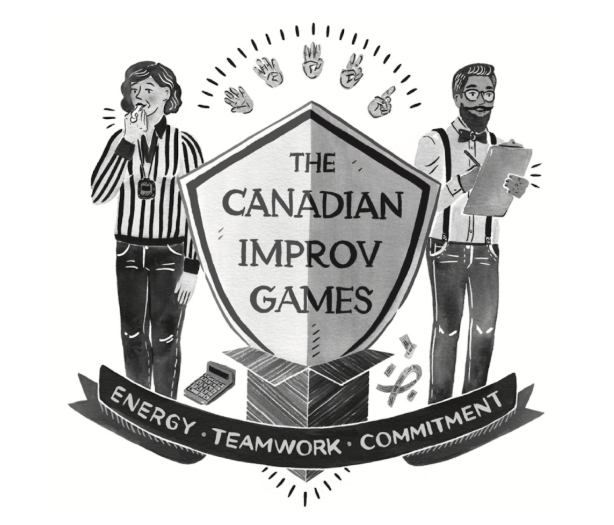
CUT the 3-point RISK category
INCREASE the 5-point COMMITMENT category to 7 points
The total points to be awarded per scene, per judge becomes 58 (formerly 59)
Voted 4.4 stars, with 66.7% five star ratings – PASSED!
New scorecard available on www.improv.ca/rulebooks-and-manuals/
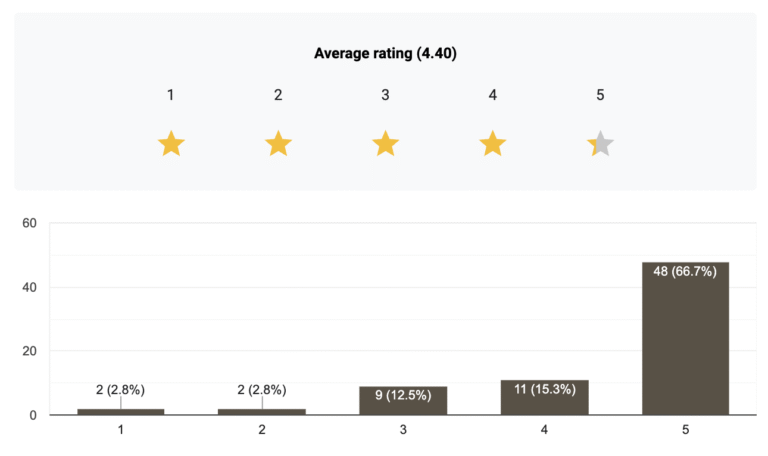
“This would make judging easier. Risk is hard to assess, particularly as improv in and of itself is inherently risky.”
“I do like “Risk” being a part of the score card, as I believe it helps score against Plug and Play situations. If Commitment can also do this, then I am fully in support of it.”
“I just think that both points are valid. Risk can often be very subjective, whereas I feel that commitment is something that stands out a bit more and is at the heart of improv.”
The OPEN EVENT, played in Junior Tournaments and some exhibition play is changed to be an ANYTHING GOES event.
4.05/5 stars, with 31% five star ratings – PASSED! New rulebook available on www.improv.ca/rulebooks-and-manuals/
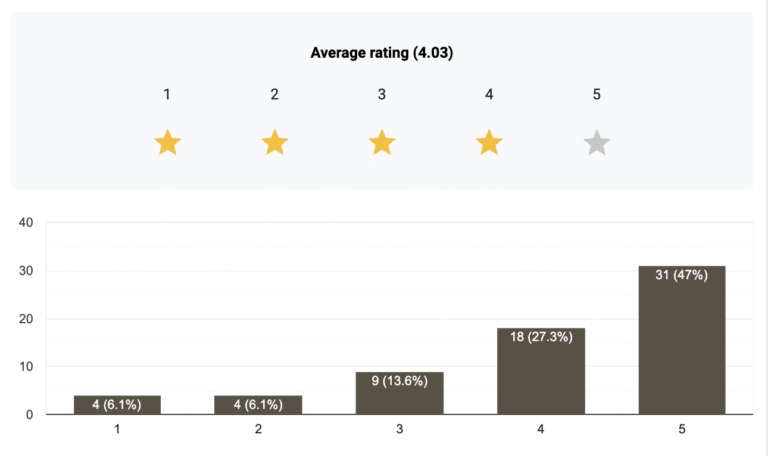
“My region previously mixed up players from different teams for open events at exhibition shows and it helped take away a lot of the nerves and stage fright as everyone was equally new. The idea of anything goes works along the same lines, especially as some teams may only be seeing a CIG event played for the first time that same night, and some events are abstract on paper!”
“Love this idea. I think this could be super fun for junior teams to perform without pressure!”
“I think this works, especially for Junior teams who are just getting used to the idea of improv. Teams could tackle the idea of a 3-minute-long scene, but newer/emerging teams could also take a long-form improv game or a game structure for their scene and have the same amount of support and experience as a more established team would.”
“Part of the appeal of the open event is feedback for teams to get a feel for how they should aim to perform when they’ll be evaluated. As long as that aspect remains, I’m all for this change!”
…and now here are the suggested changes from the survey that will NOT be implemented
CIG provides a list of 50-100 approved THEME suggestions from which themes are chosen for every night of play in every regional tournament.
The judges would select the suggestions from the list to be available for that particular night of play, ensuring that there are no repeat suggestions from earlier in the week.
3.33/5 stars, with 32.9% five star ratings – not passed.
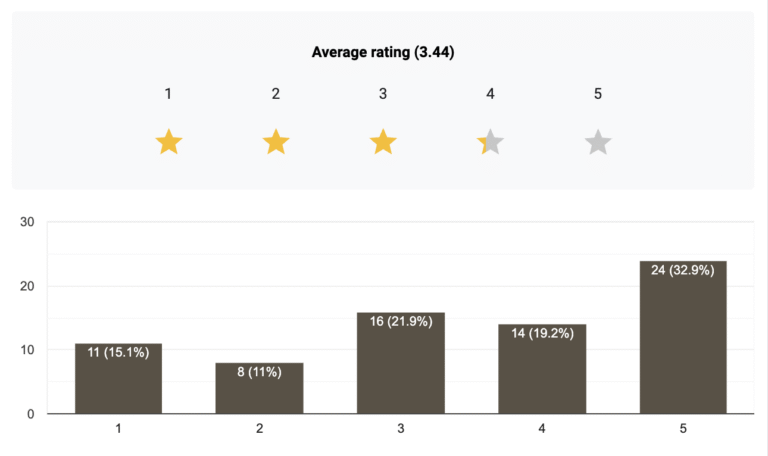
“I do like this, but also like the idea that a region could also do some more artistic and abstract ideas for finals. Maybe have this as an option and have the region’s coaches vote and decide at the start of the season to use the standardized list or to do their own thing in that region?”
“I don’t understand what problem you’re trying to solve. So long as themes are consistent across a single night of play (or across a week, in the case of a festival) then who cares what’s going on elsewhere?”
“Something that worries me about this change and others is the general want to “standardize” CIG. Although from an administrative point of view it obviously makes sense, I fear that CIG will someday become an organization overly concerned with its own rules. The innumerable charm of CIG, for me at least, was this sort of DIY attitude and regionalism. Whenever I competed at a night of play I always knew that everything there had been created, organized, and prepared by ten or so volunteers the week or night before. They had thought of the themes, gathered the What’s in the box? prizes, laid out the warm-up games, etc. And obviously that came tons of imperfections or irregularities, but I think CIG’s imperfection has always been one of its strongest qualities. I feel that most organizations in our world have this laundry list of rules and regulations, and what’s always made CIG different for me is that I can just tell that this whole tournament was thought up by ten friends in someone’s living room. Let CIG be imperfect. Let one region have ridiculously difficult themes which they’ll laugh about at Nationals. That’s why we like it (of course I have no idea how to run a National organization this is just my thought).”
“I worry teams would practice the themes in advance if given the list. I think the list should be constantly evolving and only sample suggestions be given to the coaches.”
“A good thought in principle, I have seen many confusing themes during my improv days. I think the 50-100 number is too low and teams would be able to practice or discuss every theme in the pool, which is counter to the purpose of improv. I think the theme pool would have to have at least 300 themes, so that coaches and players could still review the themes and discuss meanings if necessary, but not play out every theme in advance.”
Should the THEME EVENT be the only mandatory event in Tournament Play?
Should there be ANY mandatory events?
3.03/5 stars, with 25% five star ratings and 23.6% one star ratings. Not passed.
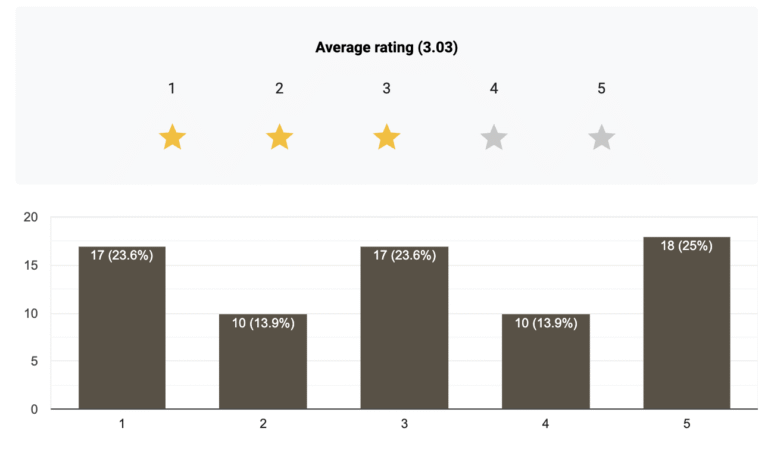
“I like the theme event staying mandatory, and all other events not”
“Honestly, if we’re going to do any event as mandatory it should be Story. This event has all the skills that are the backbone to every other event, and lends itself most readily to further improv performance styles outside of the CIG, like long-form, etc. The risk with making Theme mandatory is that everyone will start doing this event in the same way, which is already very much what we see at a finals level. We should be focusing more on storytelling skills and building up a strong foundation for the players.”
“I don’t think there should be any mandatory events.”
“Because the Life event generally score lower than the other events I worry no teams would play it and I think it’s an important skill to learn. I think more clarity around what the Life event is supposed to be is necessary.”
“We believe that life should remain mandatory as is encourages teams to demonstrate their real depth and ability in improv. Being able to create realistic environments to support the scene is a skill of physical improv that is not really highlighted in any other area of competition. It is a true challenge for students and always pushes them to become better at improv, and making it optional would allow teams an ‘out’, thus preventing them from developing their improv skills to their full potential. “Life is hard but Life Event is harder”- and that’s ok! We grow doing hard things.”
“I love and appreciate the Life Event for what it demands and brings to rehearsal and performance. I will continue to encourage my teams to perform it. But I think teams having more choices is a good thing and I agree with Theme as the only mandatory event.”
Reduce the time limit of events in Tournament play to THREE MINUTES
Provide teams with two TIME-INs to add a minute to the event of their choosing
1.97/5 stars, with 8.5% five star ratings and 54.9% one star ratings. Not passed.
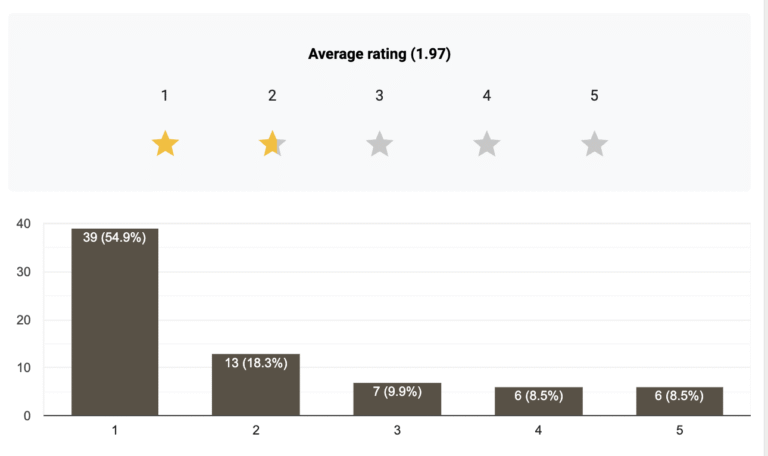
“It is hard enough to tell a complete story in 4 minutes. Cutting it down to 3 even if it is just for some events is silly. Instead we should promote and educate that ending early will not be penalized.”
“Time limit rule will be too confusing for refs and audience, and teams. (i.e. “NO! we thought we had 4 not 3 mins for this one!?”). It adds too many variants to an already confusing tournament (especially for those who have never watched improv).
I suggest across the board, sticking to either 3 minutes for all teams and all events, or keeping 4 minutes for all teams and all events.”
“I am in FULL support of this across the board change for all the reasons!”
“I think that time management has been a difficult discipline for our teams over the years. Perhaps this complicates that especially with a potential in-improv call for extra time? Even choosing in advance might still present potential confusion.”
“I do agree that teams try to fill the time because they feel as though they will be penalized otherwise. However, I feel as though 4 minutes is a good amount of time to explore. It can sometimes feel long, but most of the time it feels fine. I think 3 minutes would be almost too easy to get to for a lot of teams and that last minute is often the challenge which I think is a good thing. I don’t love the “Call-in” idea, or at least from the coaches side. I like the idea of letting the players play up there and feel as though if I were to jump in, it might throw them off more or show a lack of trust in them on the stage.”
A countdown clock downstage centre would replace audible timecalls by the timekeeper informing a team of how much time remains in their event.
3.57/5 stars, with 37.1% five star ratings. Not passed.
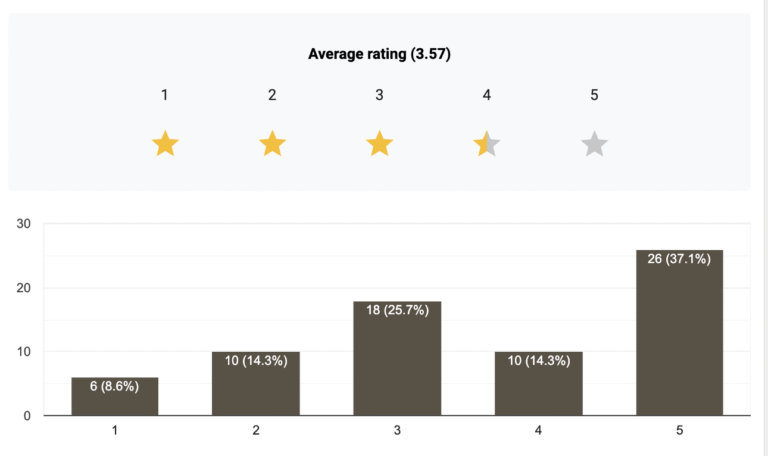
“I am not bothered by this change, but it should be used in conjunction with verbal call-outs (double call-outs, preferably) to better accommodate students and audience members with low vision.”
“Not to speak for other players, but I’d personally find a time clock very distracting and would probably take my energy away from the stage and onto frequently checking the time.”
“My teams says that “this sounds terrifying.””
“I think this is a great ideas, and would love to see this implemented at the regional levels too.”
“I love this idea and wonder if schools could find a way to do it at regional tournaments too. Projecting it on the wall using a projector in whatever space is being used, having it on an ipad on stage , something to help students. I think this would build great skills and bring in stronger performances potentially”
“I agree that the timekeeper calls tend to interrupt scenes a bit. However a clock would pose its own problems, and might be better used in addition to, rather than in place of, the timekeeper calls. The players and the audience may become distracted by the presence of the clock, and players may not be fully present in their scene. I propose instead a light which could be controlled either remotely or set to a specified time; this light could briefly turn on at one minute remaining and remain lit from the 30 second call until the end of the 4 minutes. This difference would be subtle enough that players and audience members could remain focused on the scene, but the players would still be conscious of how much time they have in their scene.”
“Yes – the amount of discussion of “did you hear the timecall?/I didn’t hear it/I heard it” was nuts – over the course of 3 years, even our most experienced players failed to hear timecalls, so having an easily understandable timer would greatly improve.”
Scores for the first half of a night of play would be announced to the audience before intermission
2.9/5 stars, with 23.3% five star ratings and 31.5% one star ratings. Not passed.
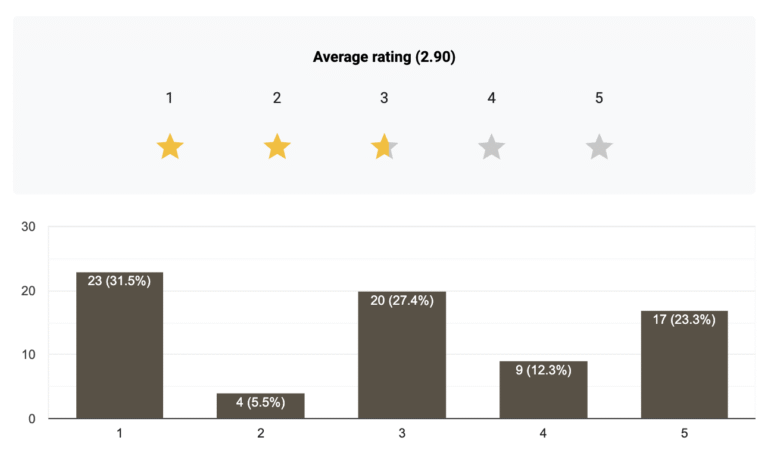
“This seems like one of those things that could go either way and just needs to be tried out. For example; it might provide underdog teams with motivation, or could be very demoralizing.”
“I worry this approach would emphasize the competition aspect. CIG reminds students ever night of play that the scores don’t matter. Revealing the scores half way through the night could deflate some teams and put unnecessary pressure on others. I worry the atmosphere would no longer feel inclusive.”
“I think the current system works. Every teams believes they are in the hunt. If it is announced at half time then lots of teams will think they can’t win and they will care more about scores than just going out there and performing. I think the scores at the end are still the way to go.”
“I think both ways have pros and cons. What I like about the current way of doing things is that it feels like everyone can win until the last minute. Although it could motivate players to “step up” for the second half, it could also lead to teams giving up. But that is the reality of competition.”
“Absolutely a great idea. I never fully understood why we stopped doing that. It ads drama and raises the stakes of the second half.”
“I mostly like this… I would suggest instead saying ranking and the point spread from first to fifth. This will still allow people to see where they are, and that there is motivation, without demoralizing a team that may be very far behind”
“This used to be how scores were read and it’s waaaaay better now that they’re read at the end. Feeling blindsided by a score at the end of the night sucks, but feeling blindsided by score when you still have to play two more scenes to play is waaaay worse. Hearing a bad score is not motivating. It’s deflating. I want my team thinking about scores as little as possible while they’re playing. Leave them at the end.”
“All of the potential benefits can be achieved by working to make the scoring more consistent.”
Standardising event scores out of 100 can allow a more accurate comparison of performances between nights of play with a differing number of judges (such as a preliminary night with 3 judges and a finals night with 5)
3.63/5 stars, with 40% five stars. Not passed.
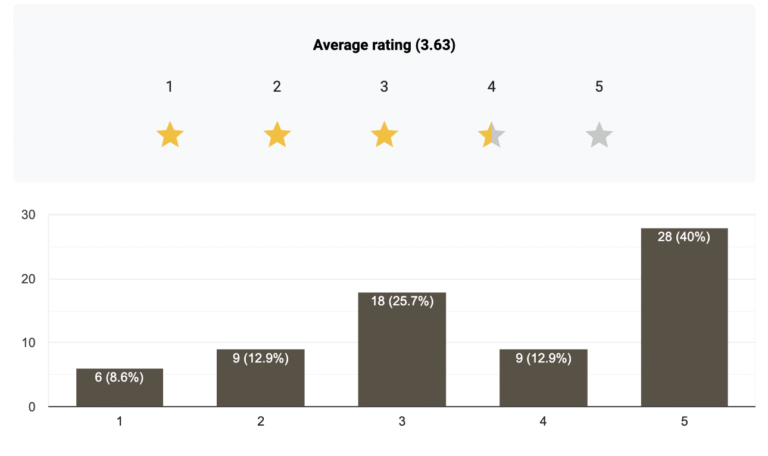
“Scores scores scores. I personally don’t like this proposal because the current abstraction of scores makes it harder to personally judge them as a player. I.e scoring 194/295 on your scene feels less demoralizing than a 70/100. Which for high school students means: “Oh, that scene was a B+.””
“It would certainly make it easier for an audience and the players to grasp, however if a team scores less than 60 I worry it would deflate that team.”
“No matter how we choose to do that (out of a hundred or an average), we need to do it.”
“It’s nearly impossible to compare our performances from tournament to tournament or with other teams (for example, during the National). The number of judges is always different, so the scoring is very hard to understand, especially as the numbers are said extremely fast at the end, and we barely have time to note them.”
“During our regional last year, we didn’t have the same number of judges from the matinee to the afternoon show. When they started naming scores, I was really surprised by how high they were, until I realized there was one more judge. Same for Nationals. Teams hear their scores, but they do not mean anything, as we cannot do the math that quickly.”
“Before we find a fancy system, I think we should at least try to divide the score by the number of judges, so it’s always the same average, and you can compare it with your previous score. It also helps with knowing if you improved or not.”
“Do not like this at all. The math teacher in me sees all the error this has the potential to introduce with rounding.”
“I also don’t understand how using a constant multiplier makes things any different, or why 125 has been chosen. In the given example it makes the top team round to 100, but that won’t always be true, and to make it true a different constant multiplier would have to be used for each night of play to make the top team 100.”
“Do not support this at all”
“As a judge, I always liked the randomness of the scores. It kept people guessing and less like school grades. I understand the reasoning and would have loved the ease of math but worry that it would feel like more pass/fail highschool grades. I know how those scores can linger with a young artist and would rather them curse a 160 rather than a 68%”
“High school students have a lot of stressful associations with percentages. Scoring scenes /100 would make it feel more like a school grade, and could put too much emphasis/expectation on score. I anticipate many players would feel some huge feelings when presented with a 68 on their Life event. As a player, I found that when scores are a little hard to wrap your head around, it’s harder to be hard on yourself.”
Teams nominate in advance which two players will perform the LIFE EVENT
1.94/5 stars, with 5.6% five star ratings and 55.6% one star ratings. Not passed.
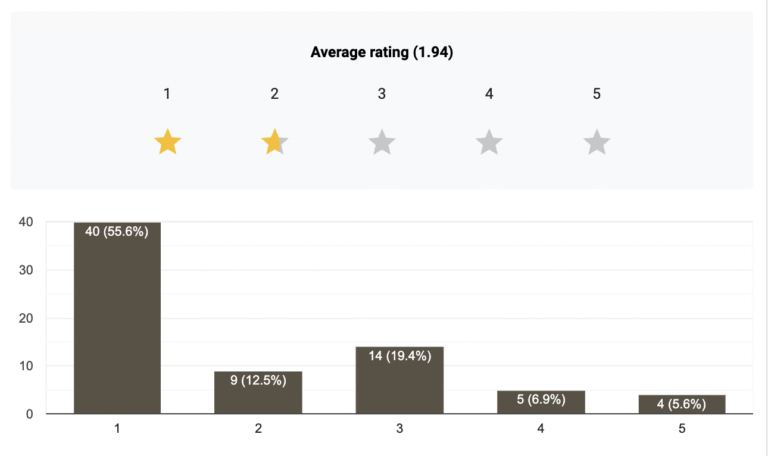
“I understand where this is coming from, but I do feel like this robs the rest of the team of another performance opportunity, which is a shame. We should be aiming for equitable opportunities for every team member, and this proposal means the “acting” kids on each team get a bonus scene and the other kids don’t. Maybe we need to change the requirements so there’s a portion of the scene that has only 2 people, or even a monologue included in the event, in order to keep things more “realistic”.”
“Could create internal team issues but I do think it is a good idea.”
“Really dislike this idea. Limits creativity insanely in my opinion. As a coach if this rule ever comes to pass I would love for life not to be mandatory so that I could have my whole team play their full 16 minutes :)”
“I would not make it a mandatory 2-player scene as it limits other intervention. But I would make it clear that we do not need more people! Players can be on the side, ready to intervene if need be, but they know they do not have to.
Limiting it to two people is not ideal. I say amazing life event with split scenes, exploring the reality of two couples, for example, who experience reality differently. I am in a scene starting with 2 people, but then some players come in for a specific reason and leave when their “job is done”.
It’s a big thing in CIG where all players feel like they need to be there at all times. But in the rules, nothing says they have to. Players need to be “ready” and “committed”. You can be on the side, attentive to what’s happening, but never go into the scenes. It’s an art to know when you’re needed and when you are not.”
“Flips every table in sight. No. Absolutely no. Not a chance, that is tantamount to the artistic murder of (possibly) the best scenes of the nights. I would sacrifice my opinion on every other matter discussed or proposed to underscore how strongly I feel about this. Horrific. This would lead to two players isolating themselves from the rest of the team in practice. For sure. Continues to flip tables, no no no no no no no. That’s basically saying “these are our two REAL actors” I think there is plenty of opportunity to develop the skills necessary to make this game better. But reducing the number of players to two (limiting the stories and characters possible) is a qualitatively, artistically, spritually, morally, and theatrically terrible idea. If we are clear that creating a background or environment isn’t necessary and that having two people on a bare stage is acceptable maybe that’s helpful…. But honestly no. Not in favour lights torch, puts torch on table, flips table. The suggestion that life can’t be wacky and strange or take place in wild worlds or awesome fantasy is ridiculous. The point of the life event is sincerity and honesty in the emotional journey of the characters..and if that’s inside a hot air balloon being towed by a sky whale so be it. It is often the only event where we see “acting” I don’t know if there is a limit to the number of words I can write in this box but I’ve been told I’ve made my point and should stop rage typing as I pace around my kitchen. I love you all very much and the life event has the best chance every night of being the best event of the night.”
“This is honestly. The worst. And so offensive.
The life event needs to go away from the two person having a chat. In my 15 years with the games it’s been genuinely infuriating that this has been a standard. This is an idea not in the spirit of improv or art. I hate it so much. Please do not entertain this idea in the slightest.”
“A team of 8 players working together is always more impressive than 2. We should be pushing for more participation not less. Leaving 6 potential team mates on the sidelines to highlight 2 is the antithesis of what the games are about.”
“I think this could be really interesting, especially since it would highlight two people’s particular skills. However, I think the teams who are truly nationals-ready should be able to manage a scene using everyone. In the past, I have seen two people dominating a scene while everyone else stood in the back, yet their scores were still very high. I don’t see why changing it to become a two-player scene would matter, seeing as the judges still rewarded those teams.”
Canadian Improv Games would like to sincerely thank everyone who participated in our survey and all of the coaches with whom we had virtual or in-person discussions. It was a genuine pleasure to read all the comments and we hope to continue to adapt to the needs of our players, coaches and audiences.
We’ve incorporated a feedback form on our Rules and Manuals page because we want to hear from you about what’s working and what isn’t. On behalf of the whole CIG team, thanks again, and happy improvising!